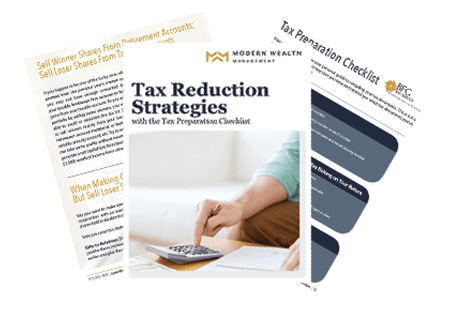9 Tax Filing Errors to Avoid
Key Points – 9 Tax Filing Errors to Avoid
- Important Things to Keep in Mind During Tax Season
- Why Risk Tax Filing Errors? Work with a CPA
- What Tax Planning Opportunities Are Available to You?
- 5 Minutes to Read
Tax Season Is Here
While Tax Day1 might seem like a long way off, this year’s April 15 deadline will be here before you know it. As you start the process of gathering your tax documents and completing your return, we want to provide a reminder of common tax filing errors to look out for. Avoiding these mistakes can help ensure your taxes are correct and prevent unnecessary delay or feedback from the IRS.
Tax Filing Error #1 – Waiting Until the Last Minute
The unanimous No. 1 tax filing error is waiting until the last minute. There’s no need to create that unnecessary financial stress for yourself. Oftentimes when people wait until the last minute to file, they’re missing out on some very impactful tax planning opportunities. That leads us right into our second tax filing error to avoid.
Tax Filing Error #2 – Don’t Miss Out on Roth Conversions and Other Tax Planning Opportunities
This time last year as tax season was getting underway, our Director of Tax Corey Hulstein, CPA sat down with Dean Barber to talk about tax planning during tax preparation season on The Guided Retirement Show. Tax planning isn’t something that many CPAs focus during tax preparation season because they spend so much time preparing returns.
Our CPAs keep tax planning top of mind year-round, though. As they’re preparing returns, they’re always looking for tax planning strategies that can help clients in that year AND several years down the pike.
From the experience of our CPAs and CFP® Professionals, Roth conversions are one of the main opportunities that people miss. When doing a Roth conversion, you’re converting a traditional IRA to a Roth IRA. The funds in a traditional IRA are tax-deferred, meaning that you aren’t taxed on it until you take the money out of the account. Roth IRAs, on the other hands, grow tax-free after you pay the tax on the conversion.
Don’t Just Think About This Year’s Tax Return
There’s also an opportunity to essentially do Roth conversions at a discount in 2024 and 2025. That’s because the Tax Cuts and Jobs Act is scheduled to sunset on December 31, 2025. So, unless Congress steps in and changes that, we’ll revert to the higher tax rates of 2017 starting in 2026. By doing Roth conversion in 2024 and 2025, you’re required to pay the tax upfront, but you’d be doing so at today’s lower rates than if you’d keep the money in a traditional IRA and take it out after 2025.
While the tax-free growth is the main perk of Roth conversions, they can also have unintended consequences, such as making your Medicare premiums higher. Download our Roth Conversion Case Studies white paper to see what needs to be considered with Roth conversions.

Some people shy away from doing Roth conversions and other tax planning strategies because they’re zoned in on paying as little tax as possible each year. Yes, doing a Roth conversion will cause you to pay more in taxes for that tax year, but the tax savings it can create could help make tax filing in future years seem quite as bad.
Roth conversions aren’t the only tax planning opportunity you might be missing either. As you’re trying to avoid making tax filing errors, make sure that you have our Tax Reduction Strategies guide handy. This white paper drives home our point of how critical it is to focus on paying as little tax as possible over your lifetime, not just in one year. Download your copy of our Tax Reduction Strategies guide below.

Tax Filing Error #3 – Don’t Forget to Submit All Your Documents
This is a rather obvious tax filing error, but it can be an easy one to make, especially for those who do their own returns. This leads right into our fourth tax filing error to avoid, which is…
Tax Filing Error #4 – Not Using a CPA
If you’re a do-it-yourselfer with tax filing, ask yourself this question. Does the software you’re using know anything about you aside from the information you’re entering? The answer to that is obviously no. There are several reasons why it’s crucial to use a CPA when filing your return. A good CPA will ask you questions related to your personal situation so that you won’t miss any tax planning opportunities.
“When your return is done, make sure you sit down with your CPA and review any opportunities.” – Corey Hulstein, CPA
It’s important to not just use any CPA, though. Many CPAs will just focus on annual tax compliance and don’t bring forward-looking tax planning into the equation. You need to use a CPA that works alongside a CFP® Professional so that your overall financial situation and life goals are being considered. Working with a CPA who studies the tax code day in and day out can help prevent you from making various tax filing errors.
Tax Filing Error #5 – Not Addressing Life Changes
Life is full of transitions and many of them affect your tax liabilities which can lead to tax filing errors. When you begin to work on your taxes or meet with your tax preparer, identify any changes that impact your financial life. Marriage, divorce, and house buying are common life events to address, but the list extends much further:
- Do you have a child who started daycare?
- Did a parent move in with you?
- Did you turn a spare room into a home office?
Take an inventory of your life from 2023 and look for changes that could matter to your taxes.
Tax Filing Error #6 – Missing or Miscalculating Charitable Donations
Contributing to nonprofits is a powerful way to promote your values — and, as a result, lower your tax bill. So, before making tax filing errors, make sure you receive the most significant benefit by capturing all your charitable donations from the current tax year. Gather your records for all donations to qualified, tax-exempt organizations, including:
- Cash
- Tax-deductible event tickets
- Clothing
- Household Goods
- And more
Remember: When calculating your donations, use the fair market value (what someone would pay for the item now) not your original purchase price.
Tax Filing Error #7 – State Implications
As Dean always says, taxes are going be a fact of your life as long as you have money or make money and live in the United States. But let’s say that you live in New York and your best friend lives in California. Tax filing is going to look different for each of you in part due to having different state taxes.
Corey points out that having tax-exempt income or transactions, which aren’t taxed at the local, state, or federal levels, will be a bigger deal this year. That’s because a lot of people moved toward true fixed income as opposed to specific types of bond ETFs.
Tax Filing Error #8 – Tax Credits
The tax code hasn’t changed much recently, but tax credits keep evolving. There are tax credits for home improvements, electric vehicles, daycare—the list goes on. Along with reviewing the IRS’s list of tax credits and deductions for individuals2, check out what Corey has to share about the lifetime learning credit and the American opportunity tax credit on the Modern Wealth Management Educational Series.
Tax Filing Error #9 – Reporting Negative Taxable Income
Our last tax filing error to avoid is reporting negative taxable income. This happens if your deduction is more than your reported income.
We’re Here to Help You Avoid These Tax Filing Errors
Do you have any questions about the tax filing errors we’ve reviewed? We’re all human and can make mistakes, so there’s no shame in reaching out for professional help, especially with some as complicated and important as your taxes. To learn more about how tax compliance and tax planning fit within our overall wealth management services, start a conversation with our team below.
We’re here to assist you so that you don’t make any of the tax filing errors we’ve discussed. Along with addressing tax compliance for the 2023 tax year, let’s look at opportunities available so that you’re paying as little tax as possible over your lifetime.
Resources Mentioned in This Article
- 2024 Retirement Planning Calendar
- Financial Stress: How Do You Deal with It?
- Tax Planning Strategies with Marty James
- Tax Planning During Tax Preparation Season with Corey Hulstein, CPA
- What Is Tax Planning?
- The CFP® Professional and CPA Relationship with Logan DeGraeve, CFP® and Corey Hulstein, CPA
- Roth Conversion Rules
- How Does a Roth IRA Grow?
- Tax Rates Sunset in 2026 and Why That Matters
- DIY Retirement Planning: What Can Be Overlooked?
- Your Retirement Lifestyle: What Do You Want Your Retirement to Look Like?
- 4 Big Tax Mistakes Retirees Need to Avoid
- Charitable Giving in Retirement
- The Lifetime Learning Credit vs. the American Opportunity Tax Credit
Other Resources
[1] https://www.irs.gov/filing/individuals/when-to-file
[2] https://www.irs.gov/credits-deductions-for-individuals
Investment advisory services offered through Modern Wealth Management, LLC, an SEC Registered Investment Adviser.
The views expressed represent the opinion of Modern Wealth Management an SEC Registered Investment Adviser. Information provided is for illustrative purposes only and does not constitute investment, tax, or legal advice. Modern Wealth Management does not accept any liability for the use of the information discussed. Consult with a qualified financial, legal, or tax professional prior to taking any action.